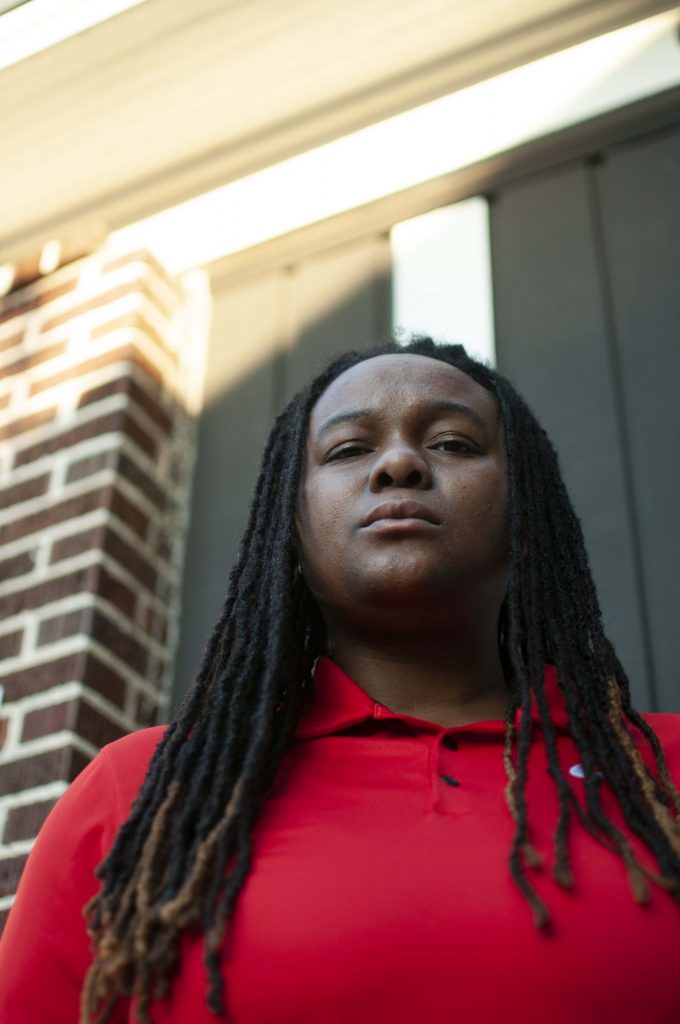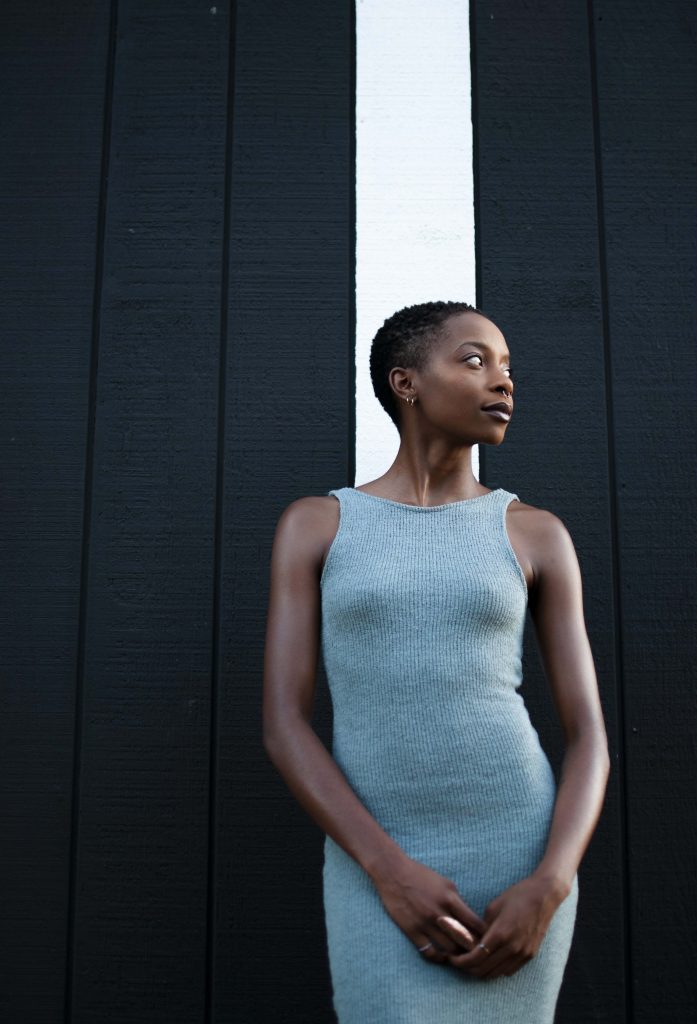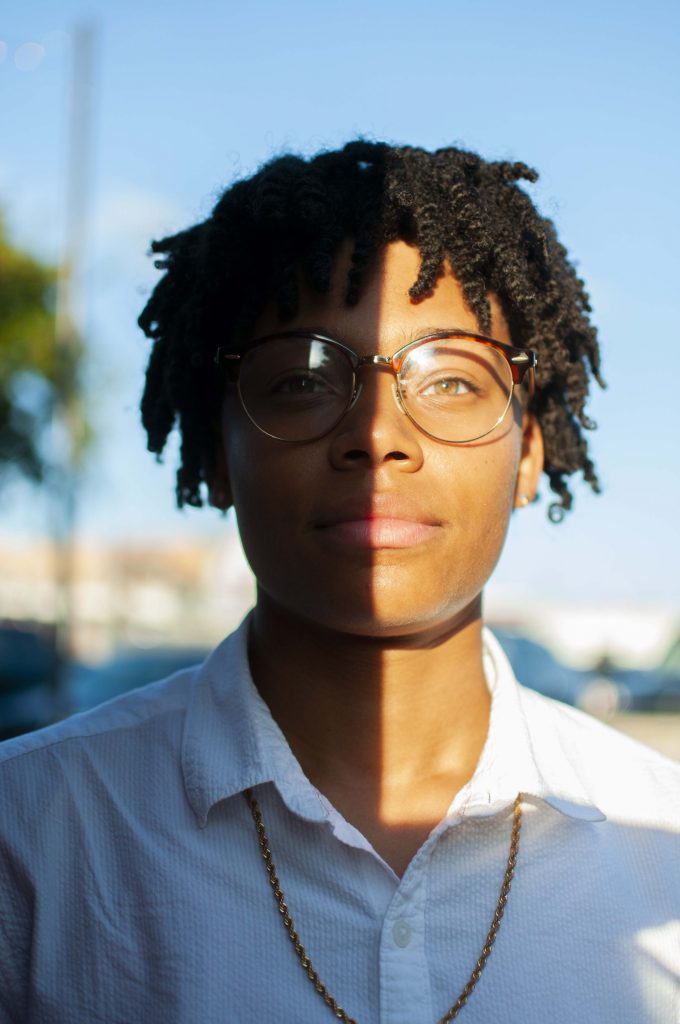SHAŌĆÖ SIMPSON

ShaŌĆÖ Simpson is an African-American lesbian woman who graduated from the University of Mississippi in 2014 and unapologetically embraces who she is. Photo by Devna Bose
ŌĆ£IŌĆÖll put it to you like this,ŌĆØ ShaŌĆÖ Simpson says, leaning back in her chair and defiantly looking me straight in the eyes. ŌĆ£For me, being a woman of color, being a lesbian ŌĆö┬Āand then being a woman, period ŌĆö to certain people can be intimidating. IŌĆÖm just locked and loaded to already being looked at as being different.ŌĆØ
But Simpson refuses to apologize to anyone for that, and she shouldnŌĆÖt have to.
Simpson, a 2014 graduate of the University of Mississippi, has identified as a lesbian for as long as she can remember. However, growing up a follower of JehovahŌĆÖs Witnesses, it was hard for her to reconcile her religion and her sexuality early on.
ŌĆ£I dealt with a lot growing up, and there were very pivotal times in my life where I thought I was getting to the point where I was comfortable enough to just go ahead and come out to my mom, but there was always something that came up,ŌĆØ she said. ŌĆ£We went to our church meetings, and then IŌĆÖd pull back and say, ŌĆśNah, they just talked about this the other night.ŌĆÖŌĆØ
Her world was ŌĆ£turned upside downŌĆØ after her family found out about her sexuality halfway through her junior year in college. Not only was Simpson ostracized by her family, but she was ex-communicated by her church in her hometown of New Albany.
ŌĆ£IŌĆÖll never forget it. My mom called me while I was at work and she was like, ŌĆśAre you coming home when you get off? Because we need to talk about something,ŌĆÖŌĆØ she said. ŌĆ£When I got home my mom was sitting on my bed with my laptop and my birthday card from my girlfriend at the time, and she just tosses it at me and is like, ŌĆśSo what is this?ŌĆÖŌĆØ
After admitting to her mother that she was a lesbian, Simpson said the two ŌĆ£got into it really bad.ŌĆØ
It was the weekend of SimpsonŌĆÖs 21st birthday.
Simpson grabbed her car keys and left. She came back a few days later, but her mother had already reached out to church elders. Within a week, Simpson was alone ŌĆö isolated from her church and her family.
ThatŌĆÖs when Ole Miss, a place where Simpson had never felt particularly welcome, became a home.
She said she received glares ŌĆ£looking like a lesbian,ŌĆØ and she still remembers comments about the color of her skin heard during her time at the university. Despite these attitudes, when she was ostracized by her family, she created her own support system with her friends and professors at the university.
ŌĆ£Teachers never know the roles they play in their studentsŌĆÖ lives, and without Alysia Steele, Vanessa Gregory and Ellen Meacham, I wouldnŌĆÖt have finished school,ŌĆØ Simpson said, tearing up. ŌĆ£I donŌĆÖt know where I would be.ŌĆØ
Those three professors, along with others in the journalism school, became like guardians to Simpson, especially Steele, who says she loves Simpson as her daughter, though their relationship had a rocky start.
ŌĆ£Honestly speaking, she started out as a difficult student. She had major attitude, and that was apparent on the first day of class. She used to sit in the back of the room and just look at me,ŌĆØ Steele said. ŌĆ£We locked eyes, actually. But she learned very quickly that the attitude was going to have to go or we were going to have a difficult time working together.ŌĆØ
But Steele saw potential in her, something that allowed Simpson to grow in the classroom and in her personal life.
ŌĆ£I’ve watched Sha’ mature into a beautiful person. She’s serious about her work, her reputation, and she works hard. She has an incredible work ethic and believes in doing her absolute best, and I admire that about her. For ShaŌĆÖ, her word is her bond,ŌĆØ Steele said. ŌĆ£I expect great things from Sha’ Simpson. And if I were looking at her right now, we’d be locking eyes on that last statement, and she knows it.ŌĆØ
Though those years of SimpsonŌĆÖs life are over, that doesnŌĆÖt mean she isnŌĆÖt still struggling with coming to terms with them.
ŌĆ£ItŌĆÖs not something that just goes away. WeŌĆÖre at the point where IŌĆÖm talking about grieving over the loss of someone who is still living (her parents),ŌĆØ she said. ŌĆ£ThatŌĆÖs the biggest issue, and itŌĆÖs a constant reminder.ŌĆØ
However, it has allowed Simpson to appreciate what she considers her greatest attribute: strength.
ŌĆ£I was just really empowered after I came out. I think once your mom and your parents know, regardless of what you go through with them, forget everybody else and what they have to say,ŌĆØ she said. ŌĆ£Some of the things that my mom said to me brought me to the point where no one else could break me.ŌĆØ
Her relationship with the university is complicated. At times, it has been a place where sheŌĆÖs been made to feel unwelcome, but itŌĆÖs a home for her all the same.
ŌĆ£I definitely think if I would have been anything than what I am, my negative experiences would have been less,ŌĆØ she said. ŌĆ£But if it had not been for those things, I wouldnŌĆÖt have been molded and shaped into the person I am today. ŌĆ£
DEJA SAMUEL

Deja Samuel is an African-American woman who attends the University of Mississippi who identifies as pansexual, and she has made comfortable spaces for herself, even in places where she has felt unwelcome. Photo by Devna Bose
ŌĆ£When I first got here, it wasnŌĆÖt like a culture shock, but it was just like, clearly IŌĆÖm going to stand out because IŌĆÖm a black woman in a majority white class, so I think I couldŌĆÖve let it make me feel left out,ŌĆØ she said, glancing out of the window.
Though she said this softly, nothing about Deja Samuel is quiet. ┬Ā
ŌĆ£But I didnŌĆÖt let it stop me. If those intentions were there to make me feel left out, I didnŌĆÖt take them to heart because I had my own intentions,ŌĆØ Samuel said.
Samuel is confidence embodied, from the slim rings on her fingers to the embroidered loafers on her feet.
She enrolled at the University of Mississippi six years ago as a biology and theatre double major before pursuing an art degree.
ŌĆ£ThatŌĆÖs why IŌĆÖve been here so long,ŌĆØ she said, laughing.
And her time at Ole Miss has been essential to her identity and her growth as a human.
ŌĆ£Here, I found a type of confidence in being okay with not knowing who I am or just being whoever I want to be,ŌĆØ she said.
Samuel only started to feel comfortable in her own space after the first time she felt unwelcome in Oxford.
Covering the state flag protests as a photographer for The Daily Mississippian, she realized ŌĆ£a lot of people donŌĆÖt want us (black people) here.ŌĆØ
She felt this same exclusion the first time she walked through the Grove before a football game
ŌĆ£I realized, like, that IŌĆÖm not really wanted or welcome here. No one said anything to me ŌĆö it was just due to the way people kind of talk to you,ŌĆØ she said. ŌĆ£I donŌĆÖt know, itŌĆÖs an energy that you can sense just walking through there.ŌĆØ
She hasnŌĆÖt been back since her freshman year.
SamuelŌĆÖs sexuality and blackness, both inherent parts of her identity, have been sources of discrimination for Samuel while sheŌĆÖs been in Oxford.
She remembers a night when she and an ex-girlfriend were catcalled and called ŌĆ£dykesŌĆØ on the Square.
But itŌĆÖs rare that she feels uncomfortable anymore because she doesnŌĆÖt allow herself to be. Just as the gay community here has made a space for themselves, she said, she has made one for herself.
ŌĆ£WeŌĆÖve created a community here, and I think that we have made our own space here,ŌĆØ she said. ŌĆ£When I first came here, I really felt invisible. I felt outnumbered, but now I donŌĆÖt really care because IŌĆÖm here to do what IŌĆÖm here to do.ŌĆØ
She feels like everyone should be seen, so she uses her photography to do that for others.
ŌĆ£WeŌĆÖre all different in so many ways, but ultimately, we are just reflections of each other,ŌĆØ she said. ŌĆ£I feel like a lot of people just want to be heard and seen and valued and know that theyŌĆÖre important and not as insignificant as we may feel sometimes.ŌĆØ
Much of SamuelŌĆÖs work focuses on her experience as a queer, black Southern woman. Her newly completed first photobook, ŌĆ£Things in Place,ŌĆØ captures LGBTQ people and couples and their experiences here in Oxford. Another project sheŌĆÖs working on is about valuing female vulnerability.
ŌĆ£It started out as a body-positive, kind of serious thing,ŌĆØ she said. ŌĆ£It transformed into me just talking to women and getting them to tell their stories.ŌĆØ
Samuel thinks the title of her own story would be ŌĆ£something like ŌĆśBecoming and Unbecoming.ŌĆÖŌĆØ
ŌĆ£I feel like IŌĆÖve stripped off so many layers. ItŌĆÖs just a continuous cycle ŌĆö me finding myself and losing myself and just going through life and learning,ŌĆØ she said.
Not only does she use her photography to explore the various facets of her identity, but she also uses it to communicate how she feels about others and whatŌĆÖs happening around her.
ŌĆ£Photography was, at first, just a way for me to capture memories, but then it became a way of communicating,ŌĆØ she said. ŌĆ£ItŌĆÖs my way to communicate to people, ŌĆśThis is how I see you,ŌĆÖ because I feel like I see the best in people.ŌĆØ
Her girlfriend of nearly a year, Jana Entrekin, said that is her favorite quality about Samuel ŌĆö breaking othersŌĆÖ walls down, allowing her to see deeper into them.
ŌĆ£ThereŌĆÖs something about her that makes people very willingly take down their walls,ŌĆØ she said. ŌĆ£I feel like this is also her most visible quality because you can see it in almost all of her portraits she takes.ŌĆØ
Samuel still only feels seen in certain spaces and sometimes only as a photographer or an artist.
ŌĆ£But as just DejaŌĆ” not really.ŌĆØ
JOJO BROWN

JoJo Brown is an African-American woman who identifies as a lesbian. During her time at Ole Miss, she has faced many uncomfortable situations due to her race and sexuality. Photo by Devna Bose
ŌĆ£IŌĆÖm just a 20-year-old African-American gay female who is trying to be a dentist one day, who plays the violin in her spare time, looking to make a change in the world,ŌĆØ JoJo Brown says, eyes bright.
It is with this optimism that Brown does everything ŌĆö it is foundational to her being.
ŌĆ£(JoJo) wants people to remember her for a good reason,ŌĆØ her girlfriend Tk Smith said. ŌĆ£She wants to leave a mark on them. A good mark.ŌĆØ
The Ole Miss junior has been ŌĆ£fully out since middle school,ŌĆØ and Brown is adamant that her comfort in her own skin is what has made others comfortable around her.
ŌĆ£My sexuality has never been an issue. I go to interviews with a suit and tie on and come out with positions that anyone else would have,ŌĆØ she said. ŌĆ£My sexuality has never held me back on this campus, and I wonŌĆÖt let that happen.ŌĆØ
In fact, coming to Ole Miss was freeing for Brown.
ŌĆ£IŌĆÖm more comfortable here than I am at home. IŌĆÖm surrounded by people who love me and have always supported my choice of lifestyle,ŌĆØ she said. ŌĆ£This was freedom for me.ŌĆØ
However, race is a different story. ┬Ā┬Ā┬Ā┬Ā┬Ā┬Ā┬Ā┬Ā┬Ā
ŌĆ£Sexuality is something you can hide, not that I do, ever,ŌĆØ she said. ŌĆ£Race is something that you can see. My sexuality has not held me back from anything, but definitely the color of my skin has allowed me to be placed in uncomfortable positions.ŌĆØ
As a biology major, she often finds herself the only black person in her class.
ŌĆ£ItŌĆÖs an uncomfortable feeling,ŌĆØ she said. ŌĆ£It makes me feel like IŌĆÖm already competing, like IŌĆÖm already at a disadvantage.ŌĆØ
ŌĆ£You feel like the fly in the buttermilk,ŌĆØ Smith chimed in.
However, Brown, a Madison County native, is no stranger to feeling outnumbered by white people. Her mother moved their family to the area to ensure that Brown would have a good education and opportunities that would not have been afforded to her otherwise.
ŌĆ£At my graduation party, my grandfather was not happy about me coming the university because of its history. IŌĆÖve heard family members say that I was going to be lynched when I got up here, making up crazy hypotheticals,ŌĆØ she said. ŌĆ£That did kind of scare me, but Madison Central was a predominantly white school. I was used to being in that environment.ŌĆØ
Throughout her college experience, Brown remembers sorority girls on her dormitory floor asking her if they could borrow her chain for a swap.
ŌĆ£That was uncomfortable, seeing the way people interpret our culture,ŌĆØ she said, eyes turned down. ŌĆ£ItŌĆÖs sad. ItŌĆÖs degrading.ŌĆØ
Recently, Brown attended the open forum held for the university community to discuss the comments made by Ed Meek on Facebook about two black women, who are Ole Miss students, on the Square. Brown spoke out passionately, calling for action from the administration.
Before she leaves Ole Miss, as part of her mission to impact the spaces she occupies, Brown hopes to see higher enrollment of African-American students at the university.
ŌĆ£We need to reach out to those students and let them know that they have opportunities here,ŌĆØ she said. ŌĆ£They donŌĆÖt have to be a part of the statistic. They should be the outlier, defy the odds.ŌĆØ
She thinks itŌĆÖs up to the student body to spark the change that she says needs to happen in response to the Meek situation.
ŌĆ£We need to let the world know whatŌĆÖs going on here. ThatŌĆÖs how other universities got the Confederate statues down,ŌĆØ she says, eyes lighting up and voice raising. ŌĆ£ThatŌĆÖs what itŌĆÖs going to take here.ŌĆØ
As for Brown, she plans to be a part of the change.






